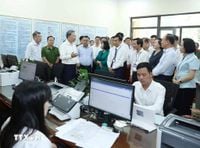On July 1, 2025, General Secretary To Lam led a high-profile delegation to inspect the implementation of the newly established two-level local government system in Hanoi, focusing on Phuc Thinh commune and Tay Ho ward. This visit marked a crucial step in assessing the effectiveness of administrative reforms aimed at creating a more streamlined, efficient, and citizen-centric governance model in Vietnam's capital.
The delegation included prominent figures such as Politburo members Le Minh Hung, Head of the Central Organization Commission; Nguyen Duy Ngoc, Head of the Central Inspection Commission; General Luong Tam Quang, Minister of Public Security; and Bui Thi Minh Hoai, Secretary of the Hanoi Party Committee. Also present were Le Hoai Trung, Chief of the Central Party Office, Deputy Prime Minister Le Thanh Long, Deputy Chairwoman of the National Assembly Nguyen Thi Thanh, alongside leaders from central and Hanoi city agencies.
Phuc Thinh commune, a newly formed administrative unit created by merging Ngoc Khe, Bac Hong, Nam Hong, Tien Duong, Van Noi communes, and part of Dong Anh town, sits strategically north of Hanoi. It serves as a vital gateway connecting Noi Bai International Airport with the capital and northern provinces. The area boasts a comprehensive infrastructure network, including the Nhat Tan - Noi Bai axis, Vo Van Kiet axis, National Highway 3, and ongoing Ring Road 3 projects. The Nhat Tan - Noi Bai corridor, in particular, is a key development driver, envisioned as a financial, commercial, service, and logistics hub linking Hanoi to northern provinces and the international airport.
During the inspection at Phuc Thinh, General Secretary To Lam and his team reviewed the readiness of infrastructure, personnel, and the application of online platforms facilitating administrative procedures for residents and businesses. Early assessments revealed that the new administrative units were operating continuously and smoothly, with all citizen procedures being received and processed efficiently by officials.
To Lam expressed his appreciation for the commune's full issuance of working regulations and identification of nine key tasks, highlighting the political determination behind this administrative overhaul. He emphasized the importance of shifting from an “administrative mindset” to a “service mindset,” urging officials to move from merely “doing their duty” to “doing thoroughly,” thereby earning the trust and support of the people. “The most important task for the commune now is to prepare successfully for its first Party Congress, envisioning how the commune will develop over the next five years and completing a political report that sets the local development direction,” he said.
He also underlined the need for unity within the Party Committee and Standing Committee to ensure the continuous, smooth operation of the local government machinery. Public satisfaction should be the primary metric for evaluating the performance of cadres, civil servants, and officials.
Phuc Thinh is home to several major projects that are currently being implemented to actualize urban planning, including components along the Nhat Tan - Noi Bai axis and two social housing areas covering over 80 hectares. These developments are expected to provide significant investment capital and stable revenue streams, fueling the commune’s future growth.
Meanwhile, the delegation also visited the Hanoi City Public Administrative Service Center's Branch 1, located at 258 Vo Chi Cong in Tay Ho ward. Tay Ho ward lies near key transport arteries and close to Hanoi’s city center, with synchronized technical infrastructure supporting its role as a vital service and economic hub. The ward’s Party Committee comprises 100 affiliated organizations, reflecting its political and social complexity.
General Secretary To Lam praised Tay Ho’s leadership for implementing the two-level local government model seriously and systematically from day one, with no interruptions in service. He instructed the ward to prepare thoroughly for its first Party Congress, focusing on a political report that demonstrates strategic vision, deep analysis of current realities, identification of bottlenecks, and selection of breakthrough areas. The report should also reflect the ward’s aspirations and unique identity, especially considering the significance of West Lake (Ho Tay) as the ward’s core and development engine.
To Lam called for adherence to key Politburo resolutions, including 57-NQ/TW, 68-NQ/TW, and 15-NQ/TW (dated May 5, 2022), which lay out Hanoi’s development goals through 2030 and vision to 2045, as well as the Capital Law 2024. He urged Tay Ho to design scientific, well-structured action programs with clear priorities, timelines, responsible agencies, and evaluation criteria. This approach is not merely administrative but embodies a spirit of innovative management and effective implementation of Party resolutions in practice.
Digital transformation was a key theme during the visit. To Lam encouraged the acceleration of digital literacy campaigns, the application of artificial intelligence to improve workflow, digitization of citizen records and cultural heritage data, and building a smart, modern, and transparent digital government. These initiatives aim to enhance service quality and accessibility for residents.
Both Phuc Thinh and Tay Ho demonstrated the effectiveness of the new two-level government system on its first day of operation. Across Hanoi, all 126 communes and wards launched their public administrative service points smoothly, earning high satisfaction from citizens. The Hanoi Police also provided swift, efficient services, reflecting the broader commitment to public service reform.
To Lam stressed that the core principle of grassroots government must be to stay close to the people, understand and meet their needs, and for leaders to uphold responsibility, striving for efficient and effective administration that truly serves the public. He urged local officials to foster a spirit of dedication, political courage, intelligence, and ethical conduct, becoming pioneers in renewing management thinking and prioritizing service quality.
Both administrative units face the challenge of building on their rich cultural, historical, and revolutionary traditions to harness internal strength and community solidarity. The people of Phuc Thinh and Tay Ho are described as patriotic, hardworking, creative, united, and eager to learn—qualities that will support their active participation in Hanoi’s and Vietnam’s broader development journey.
As Hanoi embarks on this ambitious administrative reform, the inspection led by General Secretary To Lam underscores the political will to create a leaner, more effective government that puts citizens at its heart. The success of these pilot efforts in Phuc Thinh and Tay Ho will likely set the tone for wider reforms across the country, aiming to modernize governance, enhance public trust, and drive sustainable development in the capital and beyond.


